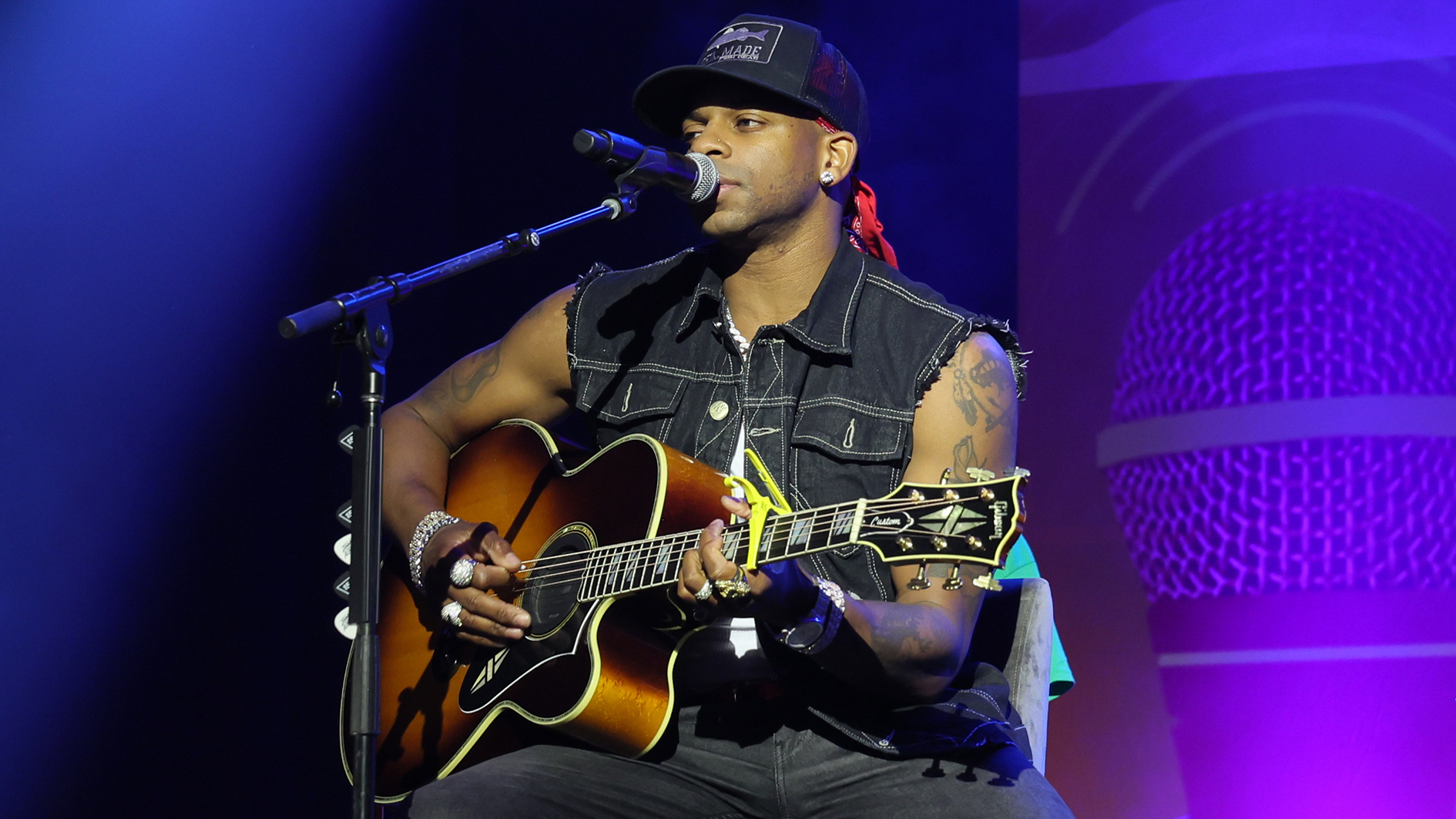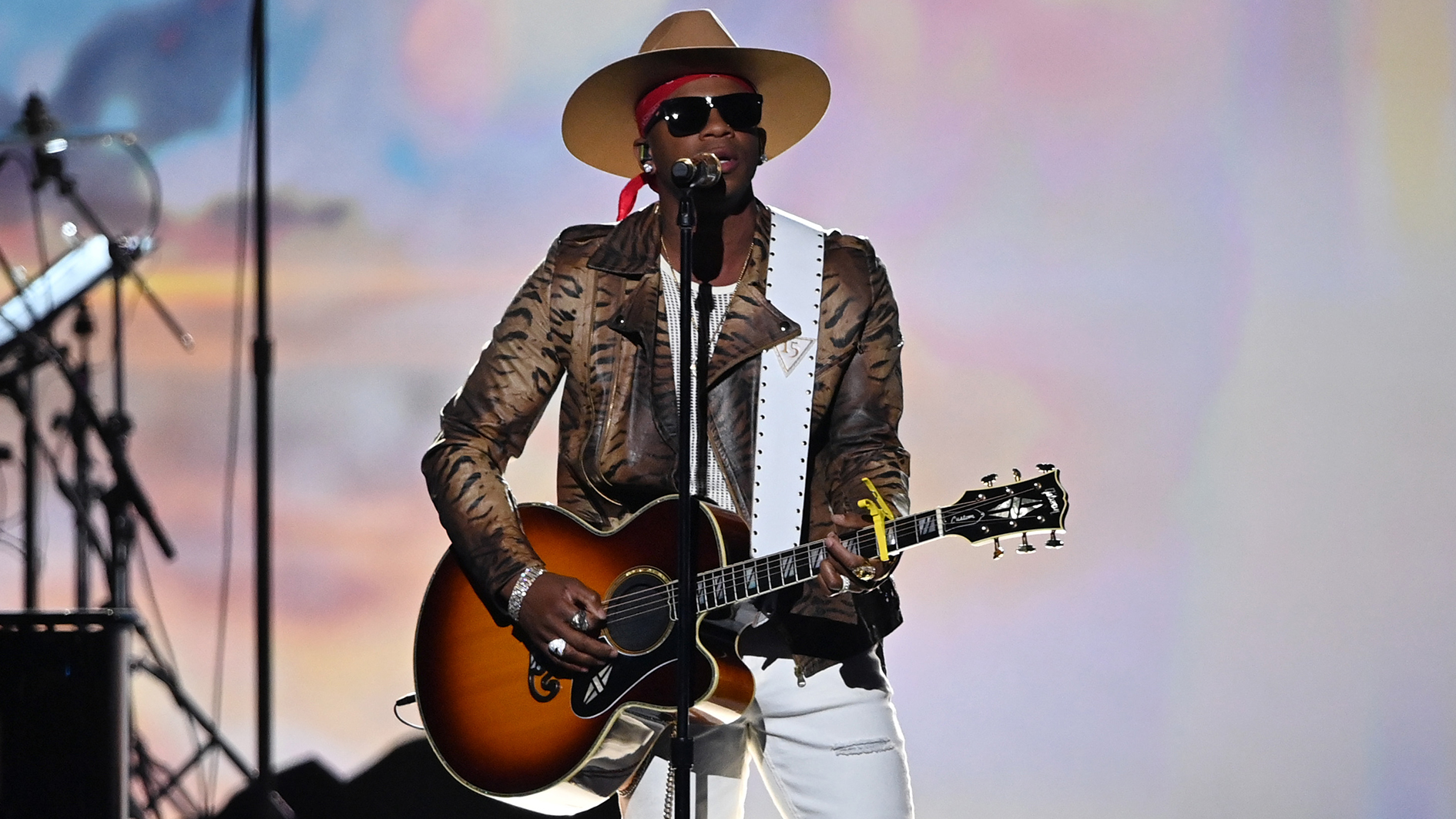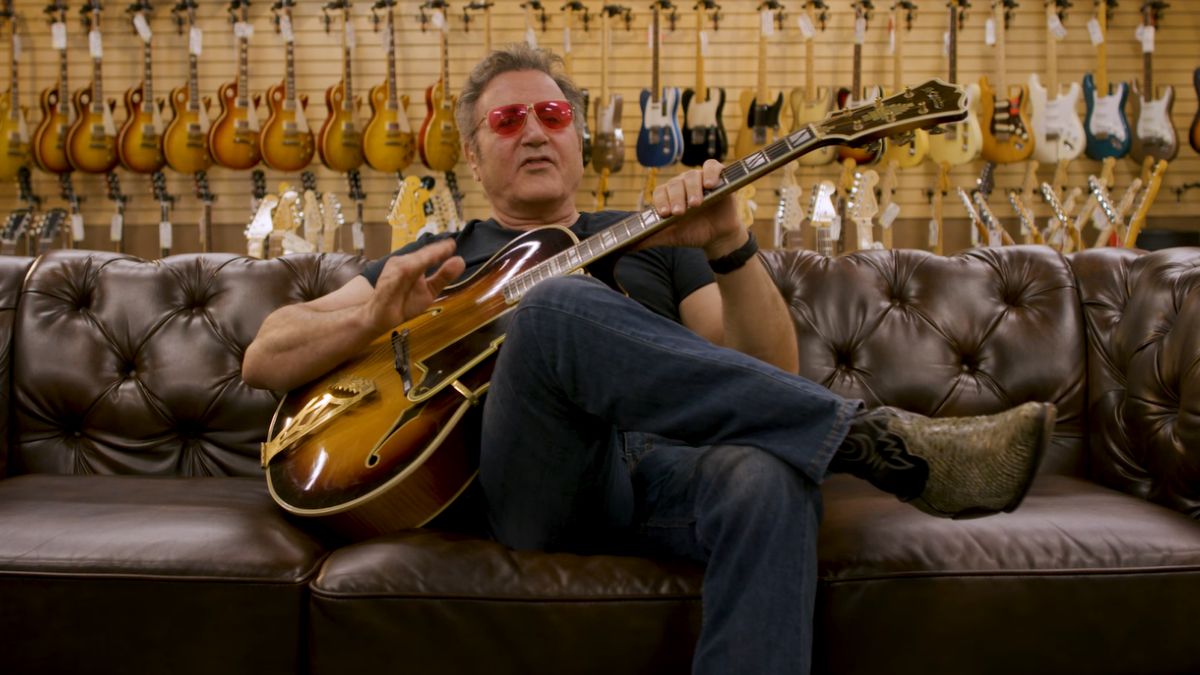Country music star Jimmie Allen talks mental health: “Music has always been my go-to, but there are times I can't get out of my head long enough to write”
The self-taught guitarist and multi-instrumentalist discusses his struggle with bipolar depression, and shares advice for those suffering with mental health issues

This article is part of GuitarWorld.com's series of interviews and features with artists addressing and raising awareness around themes of mental health, particularly as they relate to musicians.
There is a telling moment in Jimmie Allen’s story: it presents six seconds into episode two of All In, a six-part YouTube documentary about the singer-songwriter’s ascent from a youngster growing up in Milton, Delaware, with dreams of stardom, to one of country music’s most unlikely success stories.
At that moment in the clip, the camera zooms in on Allen’s hands – clasped as if in prayer, but at the same time gripped as if in a moment of anxiety. With head bowed, under the brim of a baseball cap, he sighs audibly and remarks, “Let me mentally prepare myself for that.”
Mental preparation is the story of Jimmie Allen’s life and career, and neither has been easy. Diagnosed with bipolar depression as an adolescent, he spent his teenage years navigating mental health challenges while refusing to let stigma and stereotypes defer his dream of carving his place in the music industry – the country music industry in particular.
Allen arrived in Nashville in 2007 with 21 dollars in his pocket, an air mattress, and a car he eventually lived in. Against odds that could easily have felled the strongest will, he focused on his strengths: a powerful voice, songwriting skills, and unwavering determination to knock on – and knock down – industry doors and barriers.
Now, a few years into his career, Jimmie Allen is a major force, with Number One hits and multiple industry awards, including 2021 wins as ACM New Male Artist of the Year and CMA New Artist of the Year.
In June, he released his third studio album, Tulip Drive. While many artists now opt for EPs and singles, Allen went the distance – as is his way – with 17 tracks that cross a spectrum of genres, from on my way, his duet with Jennifer Lopez, to down home, a poignant tribute to his beloved late father.
Get The Pick Newsletter
All the latest guitar news, interviews, lessons, reviews, deals and more, direct to your inbox!
On a day packed with interviews, each limited in duration because everyone wants a few minutes of his time, Jimmie Allen spoke to Guitar World not about Tulip Drive, but about mental health, the intersection – and lack of – between mental health and houses of worship, and what he hopes his music and message can bring to the community at large.
When we talk about country music, we always go back to “three chords and the truth”. You shared your truth with the Untitled Song. You originally posted it two years ago and reposted it this year. Why then, and why again now? Was it different the second time?
“I felt like I was in a place of sharing. A lot of people out there need help, and if I can be the one to help somebody, that’s what I’m all about. It wasn’t a different response this time, but it was more response because I have more followers.
“The truth is that people are hurting, and they’re looking for something or someone to lean on. I never want to be one to waste my platform, so what I share is true. It’s what I’m going through, and what a lot of other people are going through as well.”
In the accompanying Instagram post, you wrote, “Mental illness is something I have struggled with my entire life.” What is your earliest memory of that struggle?
“When I was young, I realized that I would feel a certain way one day and feel completely different the next day. I thought I was crazy, but my mom said, ‘No, you’re just different. Your brain processes things differently. Your brain reacts to things differently.’
“I found out that my great-grandfather, my grandfather, my great-grandmother, and my mother’s brother were also bipolar, and so I just accepted it. Being bipolar is not a weakness. It’s just how I’m made. I can look at it as a disability, or I can look at it as ‘I’m different.’ And so I’m different.”
I think everyone who deals with mental health needs someone they can talk to
You were diagnosed at 13. At that age, did you feel a need to explain it to family, friends, classmates? How did they react? Did you receive support? Judgment? Misunderstanding?
“I didn’t feel judged. My parents raised me to be who I am, and be proud of who I am, and that how people feel about me is their issue, not mine. So I accepted it, and luckily I didn’t feel any judgment from anybody that knew.
“I didn’t tell people; I didn’t start telling friends until my ninth-grade year. I held on to it for a while, not because I wasn’t sure how people would feel, but honestly, because I was just too lazy to want to have to explain it every single time!”
What has helped you most in taking care of your mental health?
“I think everyone who deals with mental health needs someone they can talk to. My dad was the one person in my life who was like the balance for me. He could pull me back when my thinking got out of hand. He would talk to me, take me to our favorite fishing spot, things like that. He was that person for me.
“I’ve gone to a few different therapists and psychiatrists to get a better understanding of where I was and what I was going through. I’ve had to change medications, because one made me feel like a zombie. I couldn’t catch a groove, if that makes sense. The medication I’m on now doesn’t take me out like the other one did. It keeps me stable, I have my personality when I’m on it, and I can be creative.”

You wrote, “Every day is a constant battle with myself.” In the lyrics to the Untitled Song, you sing, “I’m always on the edge trying to find a point of living/I’m barely hanging on.” Many people who have never dealt mental health struggles will look at your achievements and think, “Why is he depressed?”
“Happiness doesn’t come from things. It doesn’t come from having the best career or a lot of money. It’s internal. That’s something else I’ve learned: sometimes your brain just doesn’t let you be happy.
“Right after Best Shot [2018] went to Number One, I thought I should be the happiest person in the world, sitting on top of the world, but I wasn’t. That was my first single, and I was by myself in my apartment and depressed. I had everything I worked for, but I wasn’t happy.
“It got to the point where I needed to accept that sometimes I need a little help to understand and be who I am. That’s when I decided to get back on medication.”
Music has always been my go-to. I started playing guitar when I moved to Nashville because I couldn’t afford to hire anyone to play for me!
Untitled Song has touched so many people. Will it ever make its way onto an album or be released as single? Is it part of the live set?
“I plan to record it. I’m just trying to figure out when to release it. It’s not in the live show yet, but I want to start including it.”
How big a part have music and guitar played in taking care of your mental health? Have there been times when you couldn’t play or write?
“Music has always been my go-to. I started playing guitar when I moved to Nashville because I couldn’t afford to hire anyone to play for me! I decided to teach myself. I’m self-taught on guitar, piano, drums, and trumpet. There have been times when I couldn’t get out of my head long enough to write. I waited it out and tried to figure out a way to get past it. Sometimes it’s just time – taking a step back and taking a break.”
Your faith is a strong part of your upbringing and who you are today. Houses of worship are not always kind when it comes to mental health issues. We’re told to “pray it away,” that we’re “too blessed to be stressed,” and sometimes we are shown the door. How did you find the right one?
“‘Too blessed to be stressed’ – that’s my favorite worst line right there! Oh my gosh, I can’t stand that!
“From day one, when I meet people or work with people, I am myself completely. That way, they know right off the bat what they’re getting, and you give them an honest chance to either like you or not.
“I visited a few different churches in Nashville, tried a few out, and I was lucky to find one that has people who like me for me. That’s how I made my decision. I found a church that has people in my age group, and a group where we meet up, hang out, and talk about life, about careers, about things that are and aren’t bothering us. My church has a young-adults support system that works for me. You have to find a church that gives you what you’re looking for.”
Do you have a closing message for readers who are struggling with mental health challenges, and for the faith community regarding acceptance?
“To people in the faith community, after the Resurrection, Christ’s last words were to go out and make Christians, and to love people. He didn’t say, ‘Love people because of where they’re from, or because of their skin color, or their denomination, or their mental health.’
“Our job as humans is to love people, without question. ‘Love people’ – it’s a simple message, but it’s hard for a lot of Christians, for some reason, and I’m still trying to wrap my head around that.
“For people who are struggling, you’ve got this. It’s okay to tell people you’re not okay. It’s okay to speak up. You’ve got a lot more people in your life that want to help than you realize, so don’t be afraid to ask for help.
“To the people in those people’s lives, support them, be there for them, let them know they’re not alone. That’s the part about mental health that gets you. It has a way to isolate you and make you feel like you’re on your own, even when you’re not.”
- Tulip Drive is out now via Stoney Creek Records/BBR Music Group.
Mental health resources
Alison Richter is a seasoned journalist who interviews musicians, producers, engineers, and other industry professionals, and covers mental health issues for GuitarWorld.com. Writing credits include a wide range of publications, including GuitarWorld.com, MusicRadar.com, Bass Player, TNAG Connoisseur, Reverb, Music Industry News, Acoustic, Drummer, Guitar.com, Gearphoria, She Shreds, Guitar Girl, and Collectible Guitar.
"They said, 'We don't have a direction yet, but you got the gig!' I said, 'Well, let me think about it'": Yngwie Malmsteen on why he turned down UFO
“I loved working with David Gilmour… but that was an uneasy collaboration”: Pete Townshend admits he’s not a natural collaborator – even with bandmates and fellow guitar heroes







![[from left] George Harrison with his Gretsch Country Gentleman, Norman Harris of Norman's Rare Guitars holds a gold-top Les Paul, John Fogerty with his legendary 1969 Rickenbacker](https://cdn.mos.cms.futurecdn.net/TuH3nuhn9etqjdn5sy4ntW.jpg)


